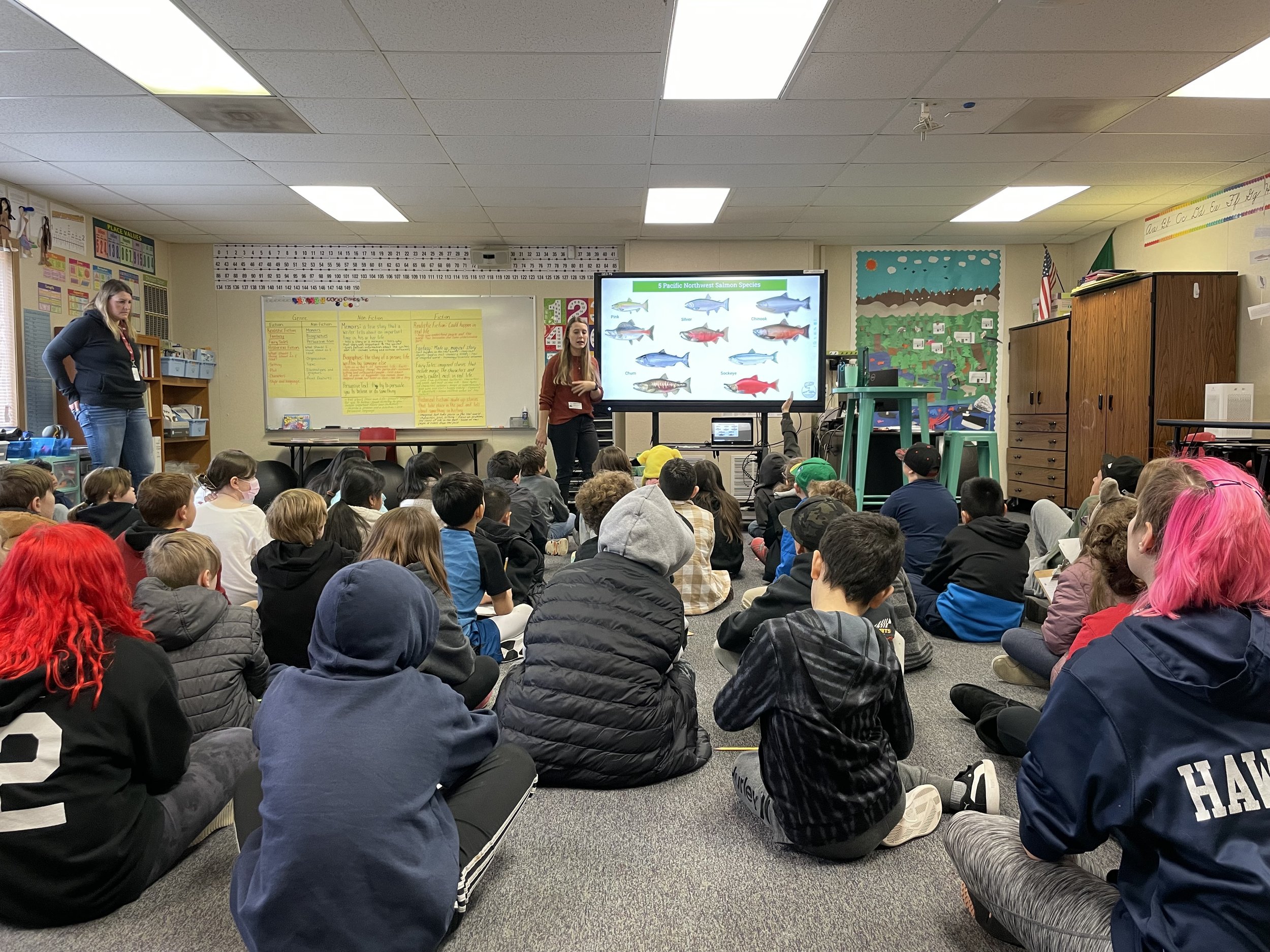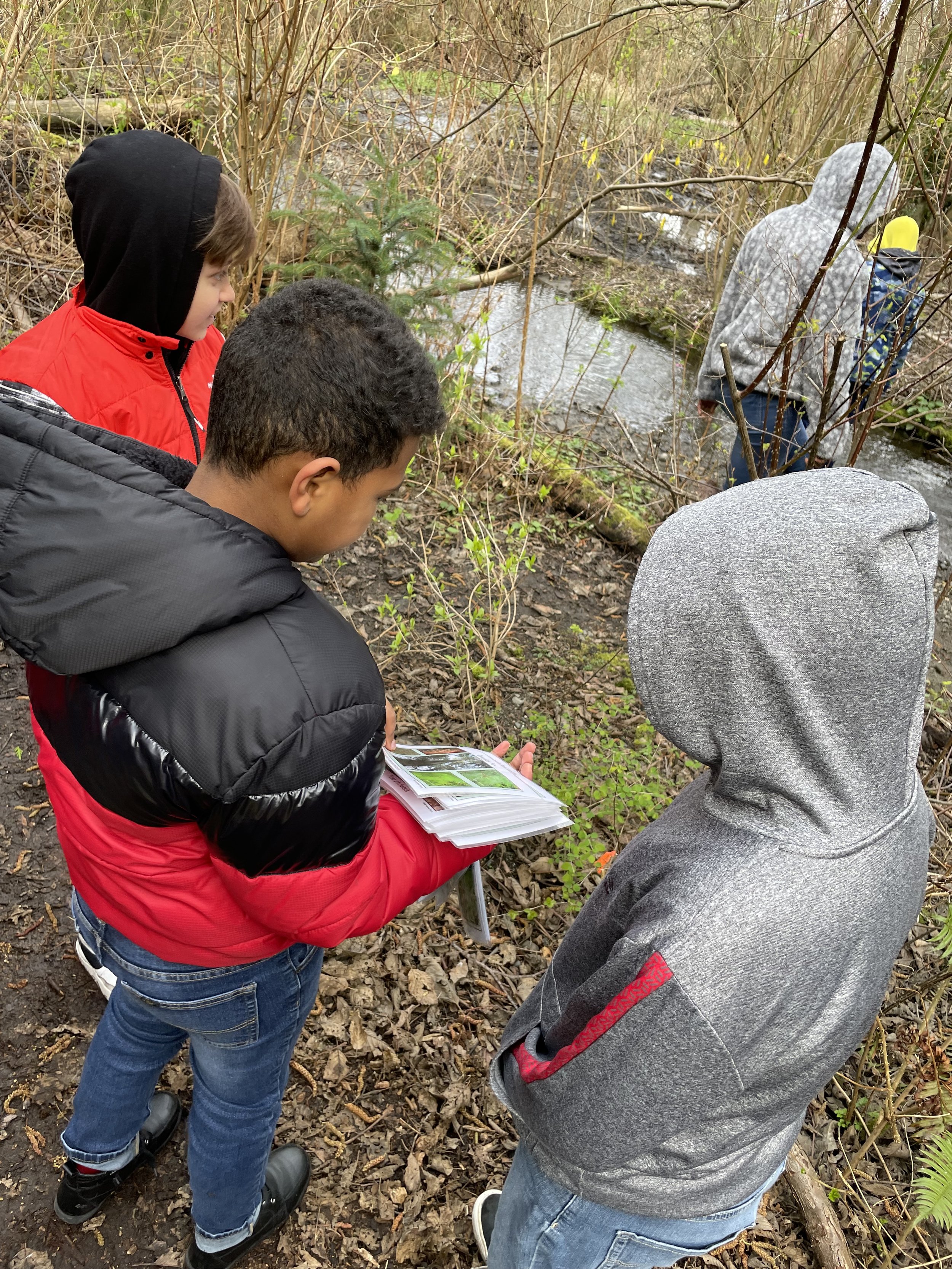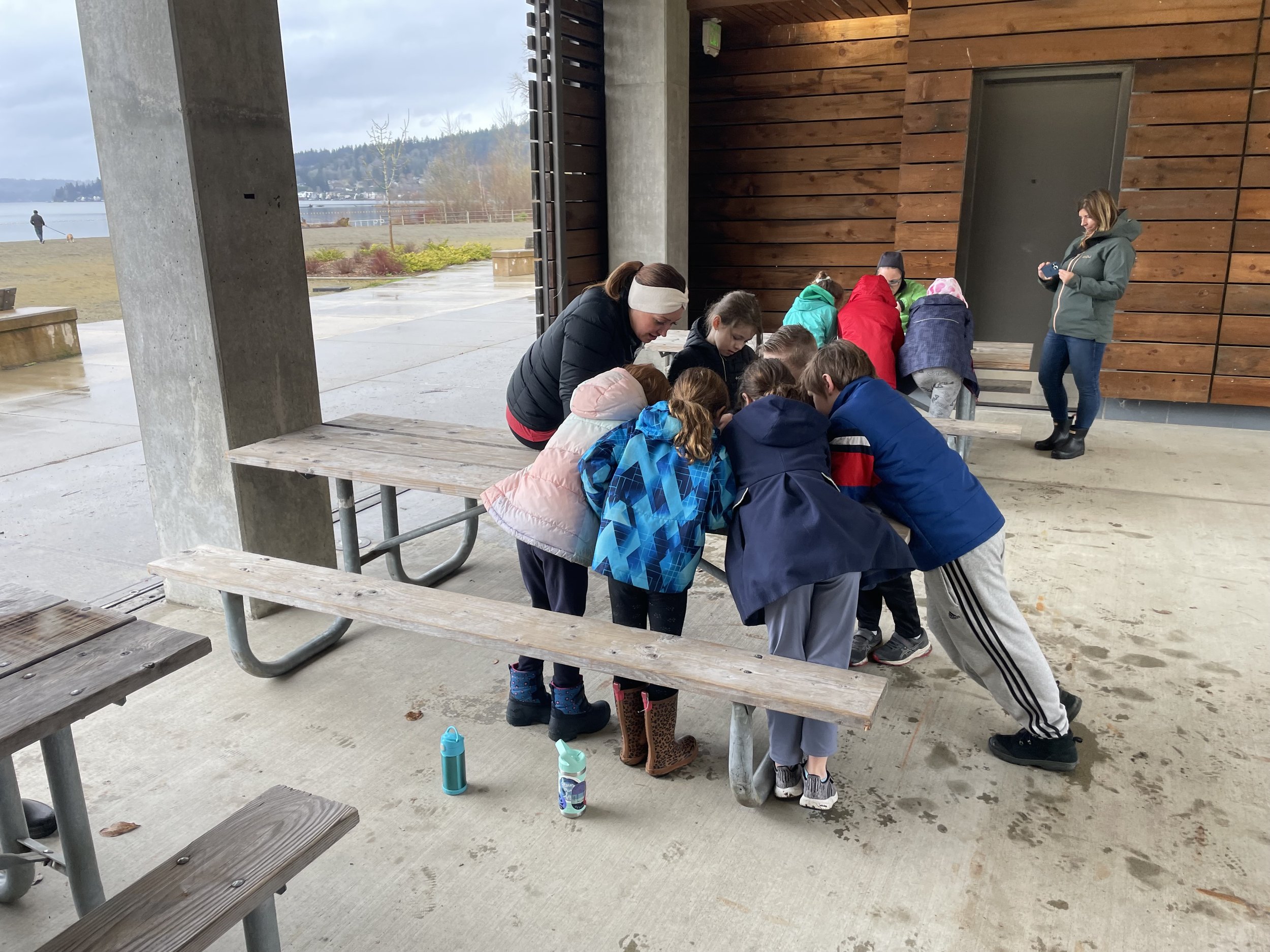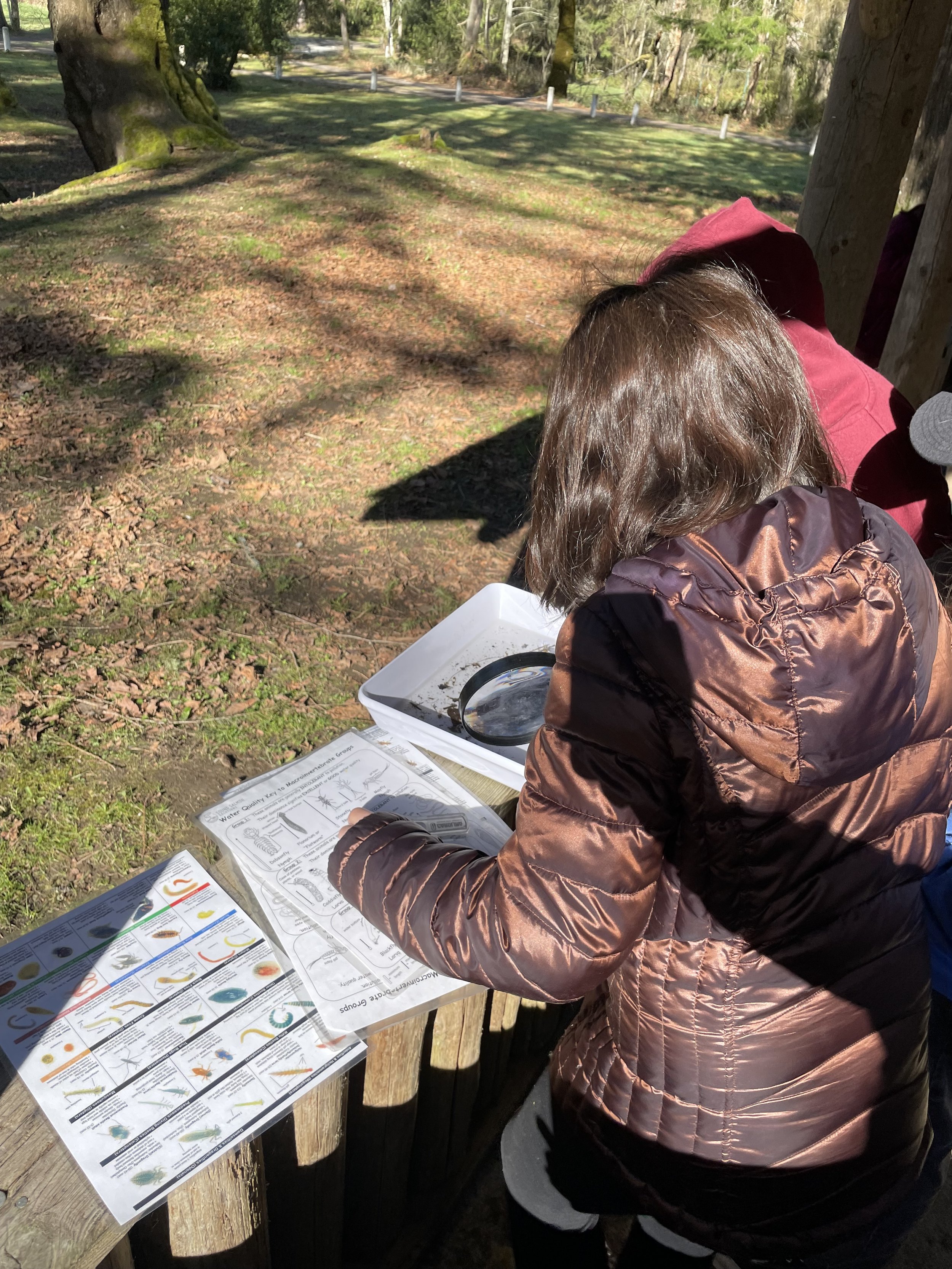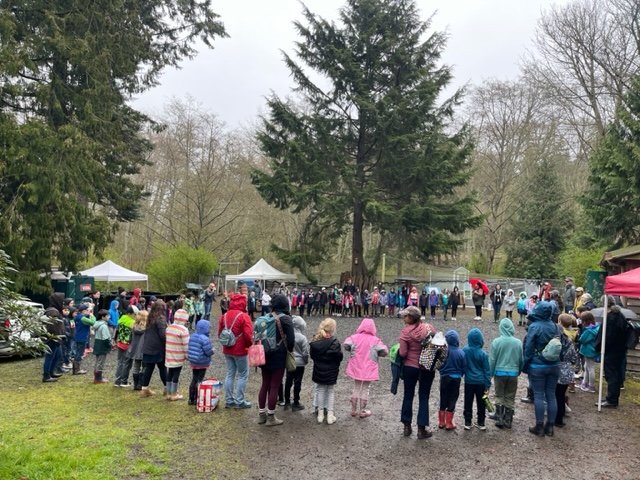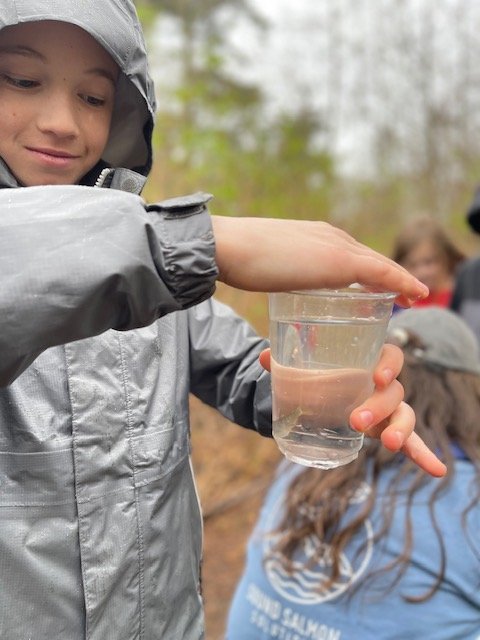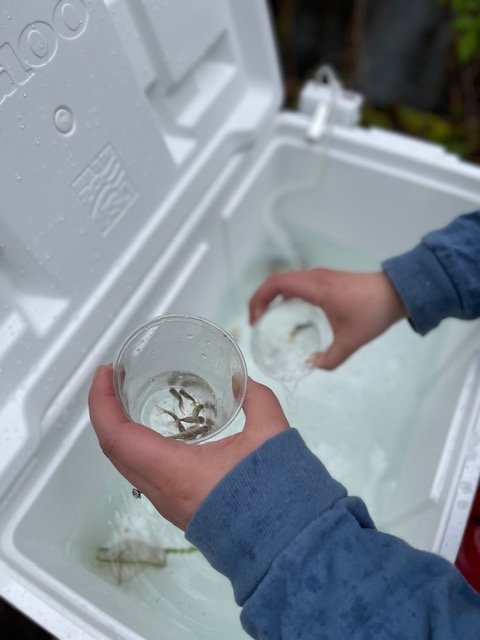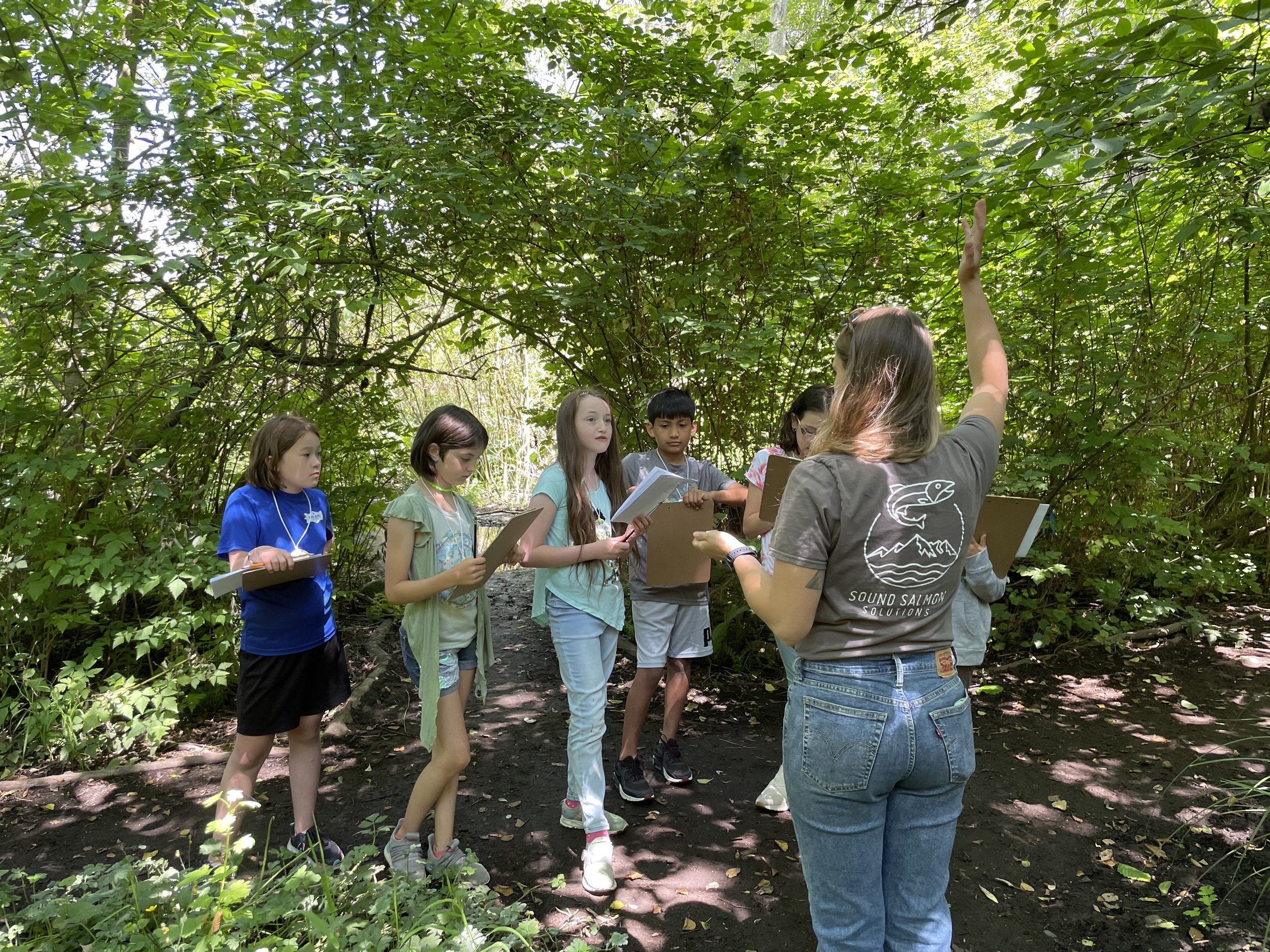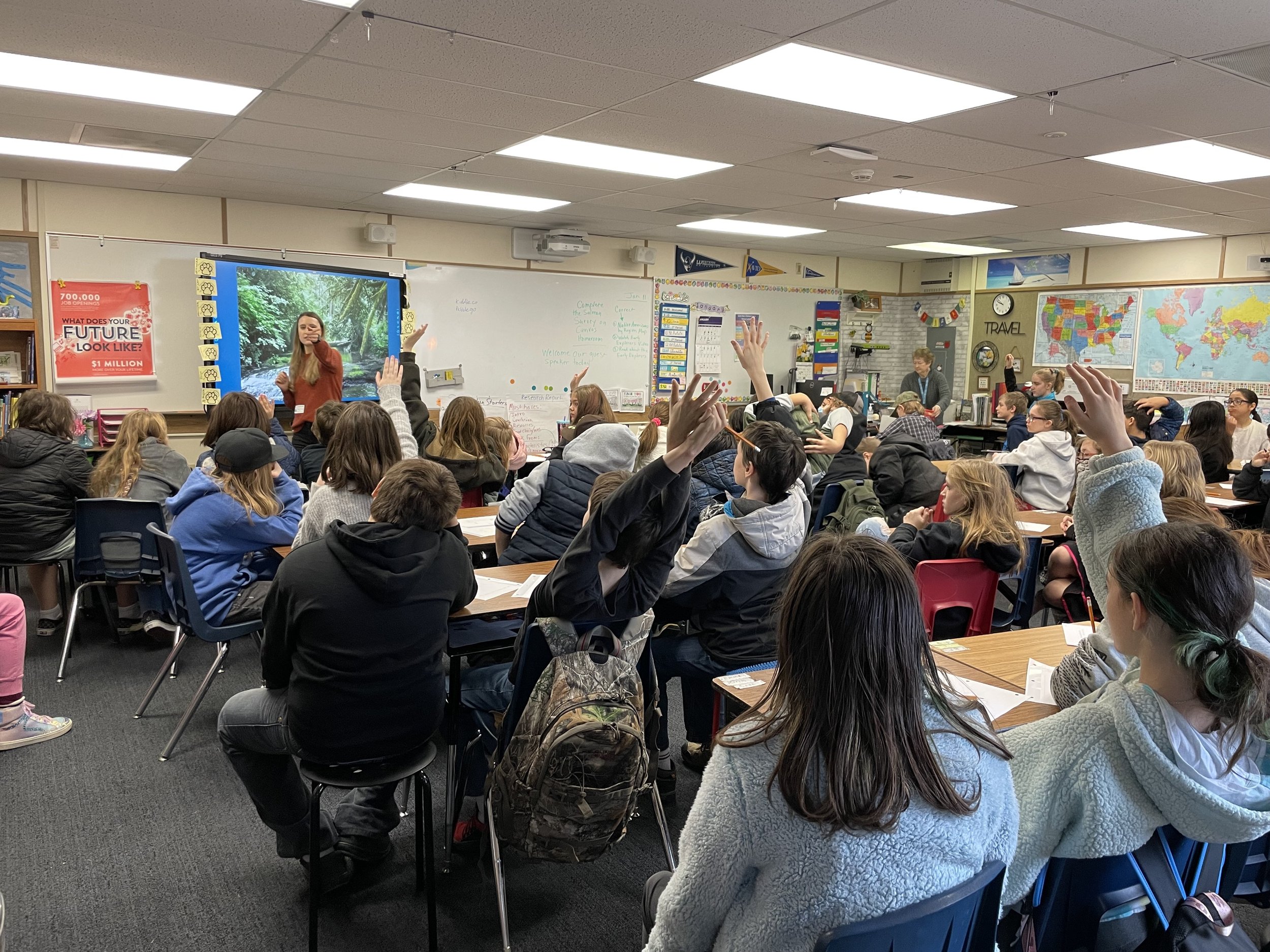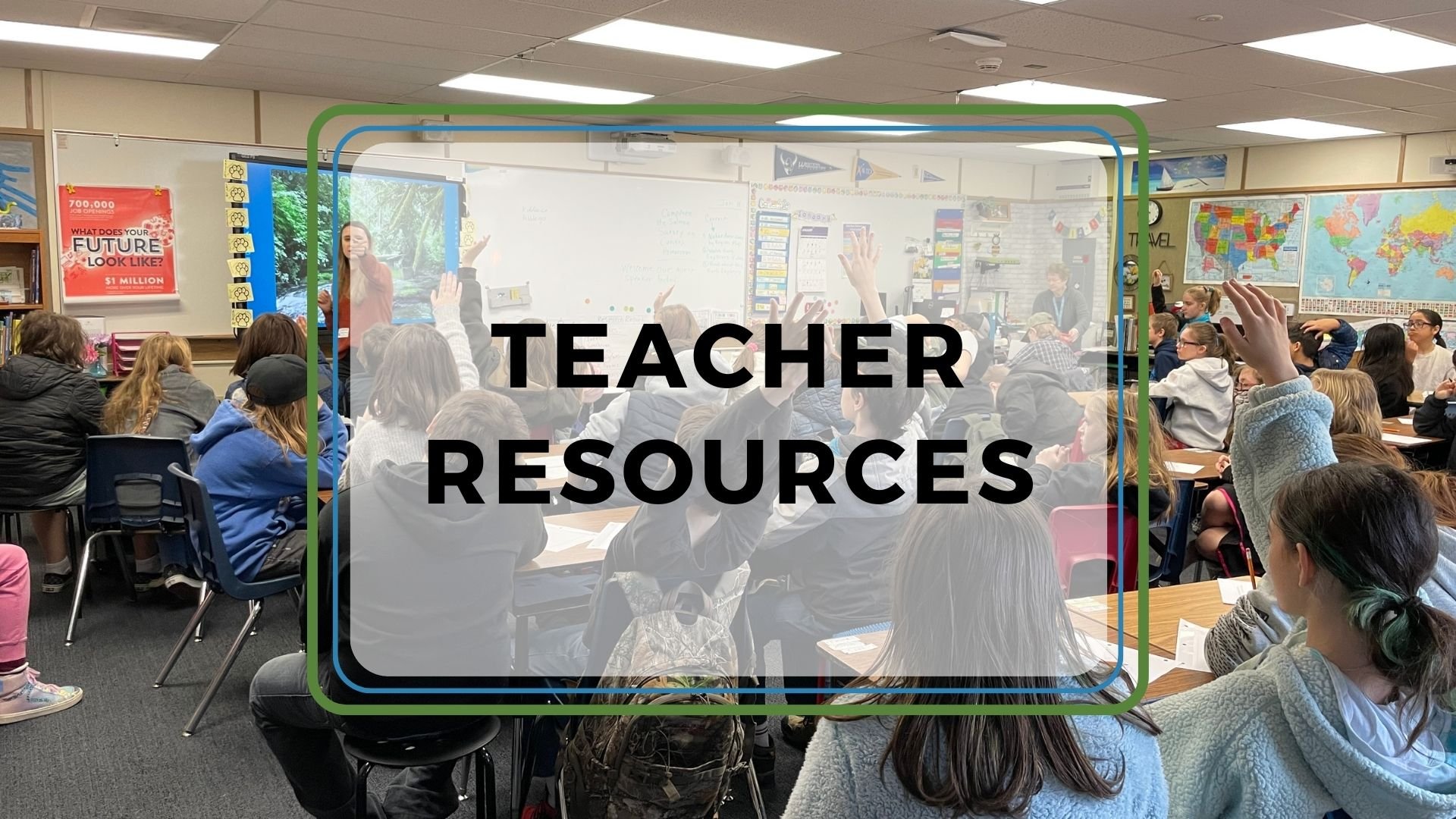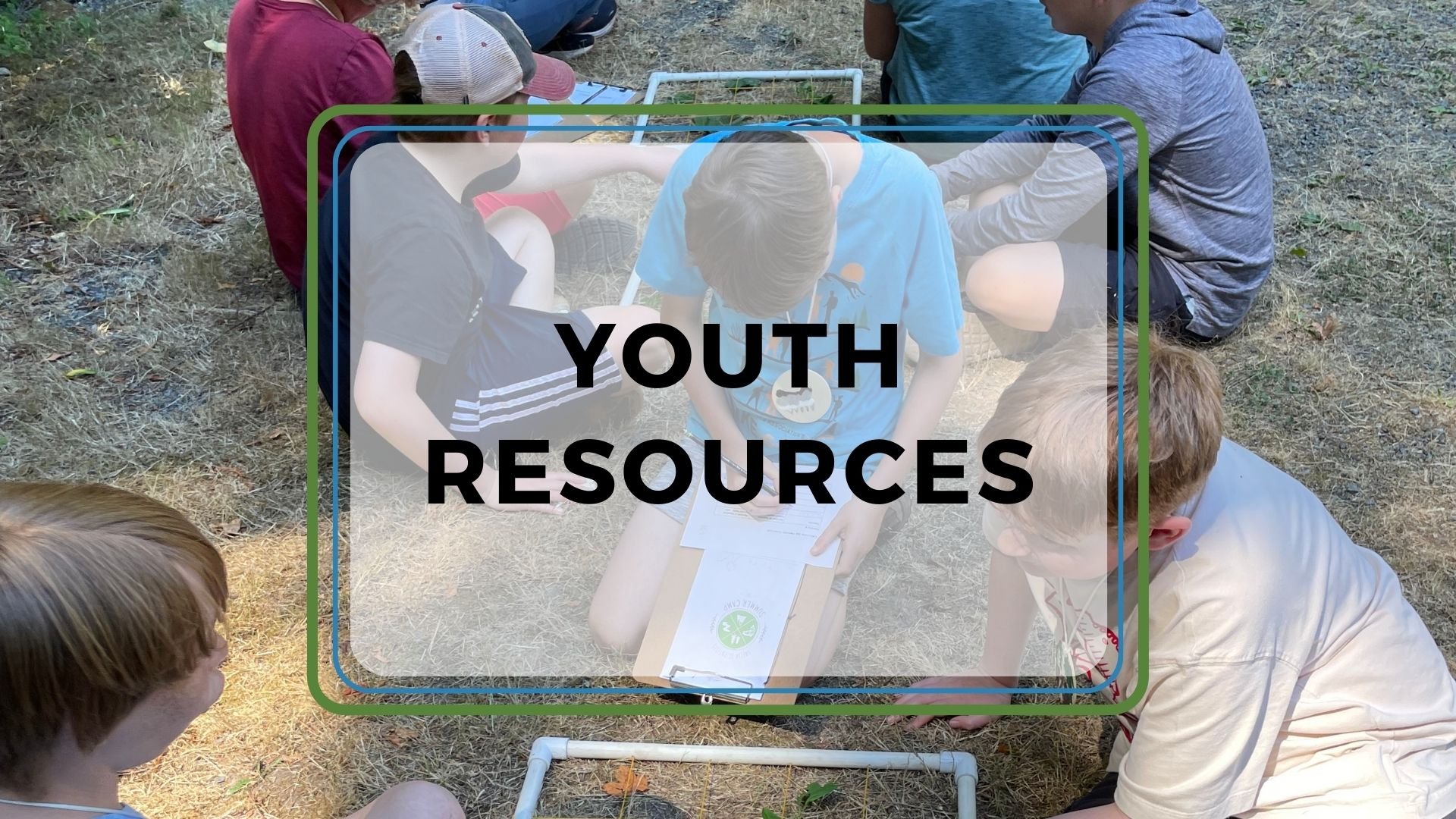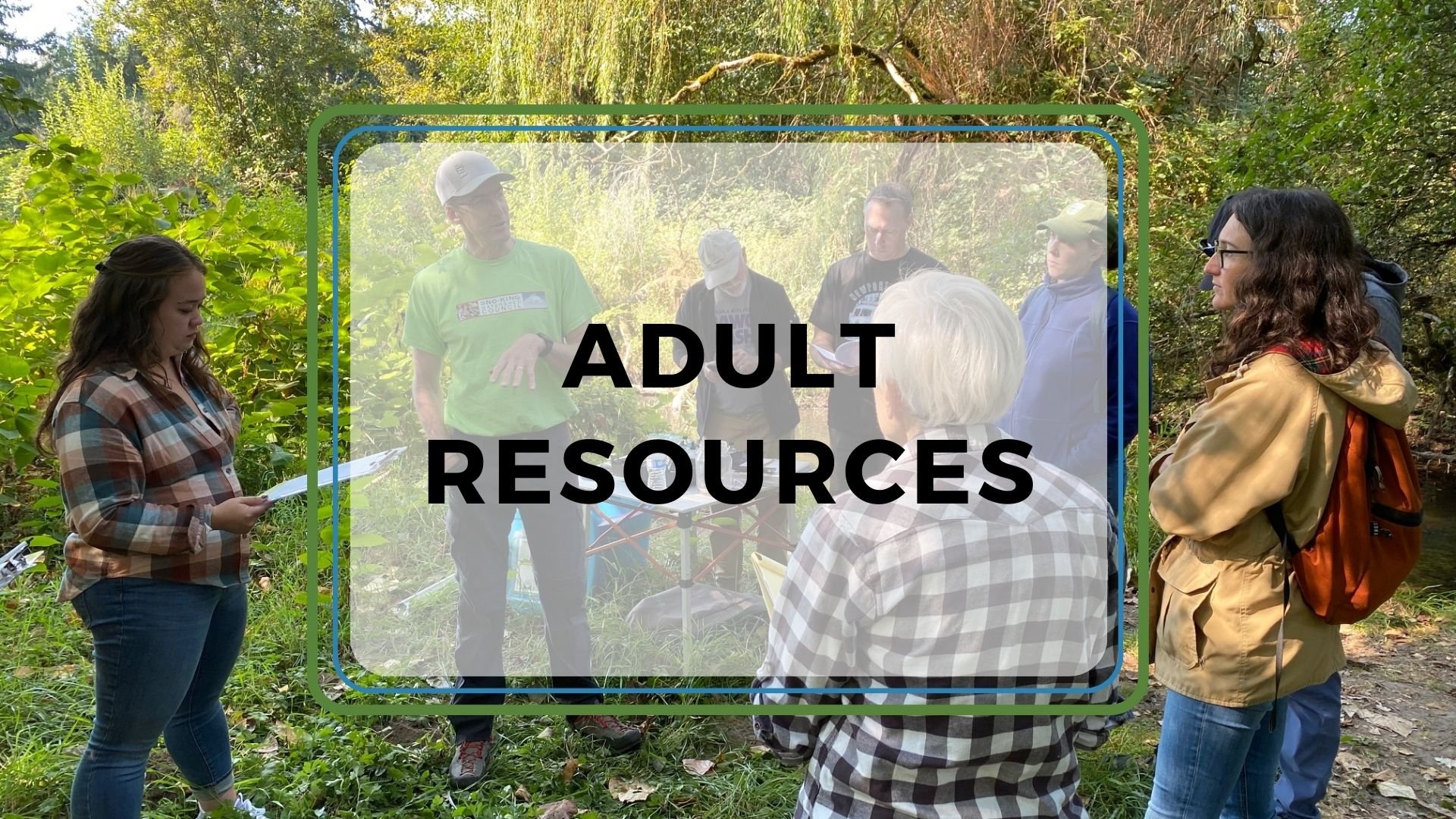Education
Squeals and giggles—"ewww!"—yet they keep wanting to look and touch.
"This is what salmon eat? Gross!"
The joyful sounds of connections being made…
We believe information transforms into learning when all our senses engage. The more we learn through experience the better we understand our connections to salmon through our shared watersheds. When you examine a mayfly nymph under a magnifying glass you are observing a thread in the food web that connects us all.
We provide hands-on educational experiences in stream ecology, water quality, salmon biology, watershed science and so much more for students of all ages. Our education programs reach broadly into our community at schools, public events, volunteer work parties, and targeted programs for community groups.
Our field trips and lessons conform to the Washington State Science Learning Standards (WSSLS) and the Next Generation Science Standards (NGSS) and are designed to stand alone but can also be combined with other lessons to form a yearlong environmental education experience. We highly encourage teachers to sign their classes up for multiple lessons to provide a meaningful and in-depth salmon and watershed ecology curriculum.
Field trips are held regardless of rain or shine. Field trips involving native tree & shrub planting can only be conducted between mid-October and mid-April. Fees vary; in some cases, we are able to offer programs free of cost to you. Fill out the contact form on the Education page to inquire about lesson scheduling and the availability of funding to support your program and/or transportation to the field trip site.
Our calendar fills quickly so if you are interested in programming for the 2025-2026 school year, please reach out ASAP to secure a spot. Please note our Salmon in Schools program is now at capacity for the 25-26 school year. We recommend reaching out a year in advance to get on the list, funding dependent!
*Please note we are now booking education programs into Jan - Jun. With March and April fully booked. If you would like to schedule a program please reach out to Brittany{at}soundsalmonsolutions.org. We look forward to the potential of partnering with you!
FIELD TRIPS
Please note these are broad programs and can be combined or adapted to fit your students needs. These programs work best for grades 3 - 12.
Macroinvertebrates - Students identify and categorize aquatic benthic macroinvertebrates as a biological indicator of water quality. 45-120 minutes.
NGSS: 3-LS4-3, 5-ESS3-1, MS-LS1-4, MS-LS1-5, MS-LS2-1, HS-LS2-6, HS-LS4-4, HS-LS4-5
Tree Planting - Students are given an opportunity to plant native trees and shrubs on an active habitat restoration site. 60-90 minutes.
NGSS: 5-ESS3-1, MS-LS1-5, MS-LS2-5, MS-ESS3-3, HS-ESS3-4
Water Quality Testing - Students become scientists by collecting water samples and using testing kits to measure and collect data on the health of a local stream. They will understand the value of clean water and how that is defined. 45-60 minutes.
NGSS: 5-ESS3-1, MS-LS1-5, MS-LS2-4, HS-LS2-6, HS-LS4-5, HS-ESS3-4
The 3 C’s of Salmon Habitat - Students learn about the critical habitat components necessary for salmon survival! This lesson can be added on to any field trip. 30 minutes.
NGSS: 5-ESS3-1, MS-LS1-5, MS-LS2-1, MS-LS2-5, MS-ESS3-3, HS-LS2-6, HS-LS2-7, HS-LS4-5,HS-ESS3-4
Rain Garden Model - Students work in small groups to create a rain garden using natural materials found nearby. This lesson can be added on to any field trip. 30 minutes.
NGSS: 3-LS4-3, 5-ESS3-1, MS-LS1-4, MS-LS1-5, MS-LS2-1, HS-LS2-6, HS-LS4-4, HS-LS4-5
IN CLASS LESSONS
Grades 3-6
Hooks and Ladders - Students become spawning salmon in this fun, interactive game that teaches students about all of the obstacles salmon face throughout their life cycle. 45 minutes.
NGSS: 5-ESS3-1, MS-ESS3-3, MS-LS1-5, MS-LS2-1
Grades 4-8
Watersheds and Water Quality -Students gain experience with the scientific process by conducting an investigation that explores the factors that increase or decrease water quality using a watershed model. 45 minutes.
NGSS: 4-ESS2-1, 5-ESS3-1, MS-LS2-4, MS-LS2-5, MS-ESS3-3
Grades 3 - 12
Salmon 101 and Stewardship - Students learn about the 5 PNW salmon species, their lifecycle and the threats they face. The second part of the lesson is all about stewardship and giving students tools to protect salmon as youth. This can be a two part series or combined into one lesson and can be adapted based on the age level. 60 minutes.
NGSS: 5-ESS3-1, MS-ESS3-3, MS-LS1-5, MS-LS2-1
SALMON IN SCHOOLS
Raise salmon in your school to give your students a first-hand look at the salmon life cycle! Eggs are delivered just after winter break, and field trips to release the salmon occur before spring break. For more information on the Salmon in Schools program, please visit our Willow Creek Salmon & Watershed Education Center page. Please note our Salmon in Schools program is now at capacity for the 25-26 school year. If you are interested in the potential of bringing Salmon in Schools to your school for the 26-27 season, please email Brittany[at]soundsalmonsolutions[dot]org
ADULT PROGRAMS
Community Action Training School (CATS)
Join Sound Salmon Solutions for five months of in-depth presentations, discussions, and field experiences which are designed to help you create positive change in your watershed. Our next cohort will begin in the Spring of 2025. For more information and to apply, please visit our Community Action Training School page.
CUSTOM PROGRAMS
Are you looking for something that you don't see here? The Education Team at Sound Salmon Solutions would be happy to help you meet your programmatic goals. Whether you are arranging a camp, nature club, or science night at your school, we can create an age-appropriate and engaging educational opportunity for your group. Please email Brittany[at]soundsalmonsolutions[dot]org providing details of what you’re looking for to get started.
Contact the Education Team
“Over a series of crafted lessons (aligned with our school’s curricular standards), these educators delivered content in a meaningful and enriching way to my students. I was able to observe and document clear growth that my students made in their understanding of Salmon and the role they play in our environment, and it’s all thanks to the incredible work of these educators and the mission of their organization.”

